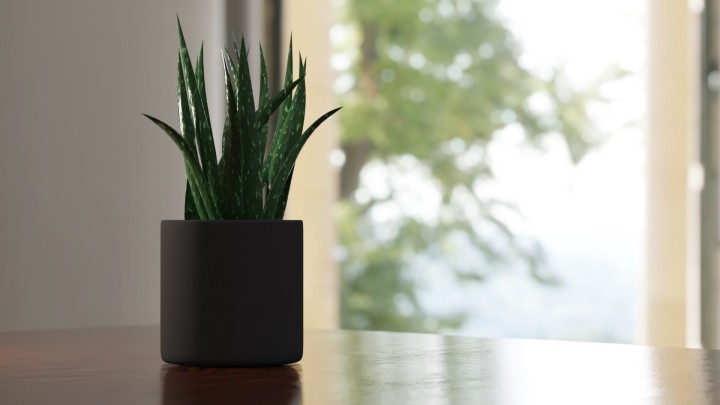Why plants are worthwhile in the office
Indoor plants are not only a great addition to the office as decoration and for visual enhancement. Plants bring with them many properties that can have a positive effect on the well-being of those present. Incorporating plants brings employees in the office closer to the beauty of nature, relaxes them and can help promote motivation. A visually appealing office and a good indoor climate are important factors that can increase well-being in the workplace. Anyone who now remembers that plants are constantly dying on you needn't worry. Many classic office plants are easy to care for and can be maintained even without a green thumb. Robust and low-maintenance green plants have proven their worth and are best suited for the office.
Stress relief and well-being
In urban areas, the view out of the window is often dreary and characterised by large-scale buildings. Nature, meadows and beautiful greenery are missing. This sight can easily affect one's mood and impair the general atmosphere at work. Often, one has to realise that one moves far too little in nature. For this reason, it makes sense to bring your own little garden into the office. The naturalness of real plants enhances well-being, because indoor plants have been proven to have a calming effect on people and can help reduce stress. Having a little piece of nature in the office is a good way to create a little balance to everyday office life and bring out positive feelings.
Improving the indoor climate
Office plants bring many positive qualities that employees can benefit from in the workplace. The operation of air conditioning and heating quickly causes the air in the office to be dry and stuffy. This has a bad effect on the respiratory system and promotes dry skin. Plants in the office have been shown to help improve the indoor climate. During the day, plants carry out photosynthesis, absorb C02 and produce valuable oxygen in this process. Especially in winter, it is useful if frequent airing can be avoided as a result. Plants are true air filters and can also absorb unpleasant odours. In addition, the moist soil causes an increase in humidity in the office space. This can help to relieve the respiratory tract and protect the skin from drying out. Good air is elementary so that the brain can be supplied with sufficient oxygen to be able to work optimally and with concentration. Stale, bad air and a low oxygen content cause fatigue and promote lack of concentration. Plants in the office can counteract this and thus make a valuable contribution to a good room climate.
A natural sound absorber
In large offices, where many people work side by side, the noise level quickly reaches a maximum. Smooth surfaces such as concrete, stone or wood can absorb sound poorly and reflect it back to a high degree. A high noise level disturbs work and promotes unpleasant side effects, such as headaches or earaches. Plants, like fabric or other insulating material, can absorb sound and reduce noise levels. The targeted use of indoor plants is a good way to absorb loud noises in the office. This can help create a more pleasant working atmosphere for all employees and reduce the impact of a noisy workplace.
Upgrading the furnishings
Many offices are furnished in a utilitarian way and do not correspond to one's own taste. It is also rare to find colourful distinctions in offices. In many offices, the furniture is limited in colour to white, grey, brown or black. Plants are an ideal addition to enhance office spaces and breathe colour into them. Bringing a little green into the office can help to complement the existing furnishings appropriately. Well-tended plants create a pleasant atmosphere and can look prestigious to the outside world. A beautiful working environment has an influence on creativity and motivation, which is why plants are optimal embellishments for the office.
Choosing the right plant
The right choice of suitable plants can be difficult for laymen at first sight. Some universal rules are easy to control and implement, even for plant beginners. Plants need a lot of light and therefore prefer bright locations. If this is not guaranteed in the office, plants that can cope with less light must be selected. Plants that require high temperatures or a lot of humidity should generally be avoided, as their requirements cannot be met in the office. When caring for plants, it is generally important to avoid waterlogging. Waterlogging refers to excessive water from watering that accumulates at the bottom of the pot. To avoid damaging the roots, the water must be dumped out and the amount of watering reduced in the future. Plants that give off a strong smell should also not be placed in office spaces, because people evaluate smells differently. What may be one person's favourite scent on earth may give another person a headache. Plants that give off little or no scent are therefore best suited. Another factor to consider is potential allergies of staff to the plants. Choosing the right plant can feel overwhelming at first. Below are some recommendations for suitable office plants to help you make your choice.
5 suitable plants for the office
Green lily
Ficus
Ivy
Elephant foot
Dragon tree
Green Lily
Green lily is a plant that originated in South Africa and is one of the most popular office plants. Since it is widely planted in German offices, it has been nicknamed the "civil servant's palm". A green lily prefers to be in a sunny spot, but can also cope with shade. This makes it easy to care for and hardy. Nevertheless, it should be avoided to place the green lily too shady, because its leaves wither quickly in the shade. It appreciates temperatures of around 20 degrees Celsius and can also stand colder in winter as long as the temperature does not drop below 10 degrees. It can store a lot of water in its roots. For this reason, it is best to water the green lily twice a week with a small amount of water - but that is all it needs! It is characterised by a dense head of leaves, with long, pointed leaves and a white edge. It rarely needs to be cut back and is therefore perfect as a low-maintenance houseplant.
Ficus
The ficus, commonly known as the birch fig, is a popular indoor and office plant. The home of the birch fig is in the tropical and subtropical areas of East Asia, Australia and Oceania. The birch fig is an evergreen plant, which means that it also bears green leaves in winter. It can produce flowers, but this rarely happens due to the cool temperatures in Germany. The ficus prefers a bright location, but should be protected from direct sunlight. As a rule, the ficus copes well with dry heating air and proves to be extremely easy to care for. The birch fig prefers temperatures of 22 to 28 degrees. In winter, the temperature should be lowered to 18 degrees, so make sure that the plant is not placed too close to the heating.
Ivy
The ivy is a climbing plant with a wide range of leaf colours. Even though it is not one of the classic office plants, it is ideally suited for this purpose. They like light to semi-shady places and are particularly easy to care for. The ivy likes high humidity, so if the air is dry, make sure to spray its leaves with water regularly. As it is a climbing plant, it can grow up well as a vine. In the office, ivy looks good as a hanging plant from the ceiling or wall. Ivy prefers a temperature of 20 degrees. Watering can be sparing, as the ivy can tolerate prolonged dryness well. If possible, the soil should always be kept slightly moist. During the growing season from May to August, the ivy needs valuable nutrients and should be fertilised with leaf fertiliser at two-week intervals.
Elephant foot
The elephant foot is a succulent native to Mexico. It stores water and therefore only needs to be watered sparingly. The stems of young elephant's feet resemble the foot of a real elephant, hence the name. Characteristic is a long, thick trunk, with a full crown of elongated, pointed leaves. The elephant foot is very robust and easy to care for, it will forgive any faults. For this reason, this plant is particularly suitable for people who do not have a green thumb. The elephant foot likes a warm environment and lots of sunlight. In winter it can stand colder, can withstand temperatures down to 10 degrees and does not need to be watered.
Dragon tree
The dragon tree is a tropical plant that is known for its air-purifying effect. It is a little more demanding than other houseplants, so you should be well informed about its care and requirements beforehand. Those who want a plant challenge or are well versed in plant care will like the dragon tree. Characteristic is the palm-like, woody trunk and a dense head of leaves. The dragon tree needs a bright and warm location, but should be protected from direct sunlight. Cold soil and draughts should be avoided at all costs and can be harmful to the tree. The temperature should not drop below 18 degrees, even in winter. The dragon tree can be sensitive when watering, the right amount is crucial. The soil must be kept moist, at the same time care must be taken to avoid waterlogging. The dragon tree reacts sensitively to calcareous water; if necessary, the water should be decalcified.
With the USM Haller Plant Worlds, USM Haller offers a stylish combination of timeless furniture with plant pots. A real eye-catcher in the home or office!





